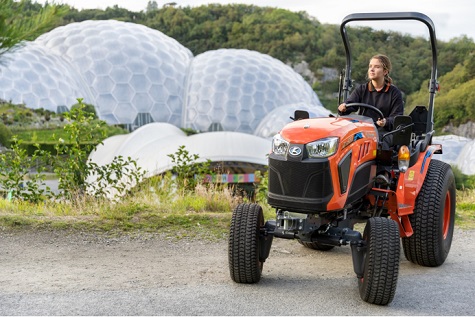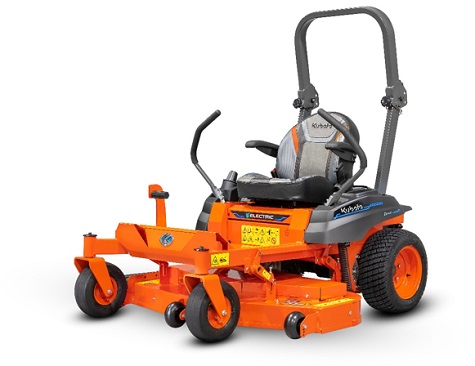

In 2023, I wrote a series of monthly articles, and their key purpose was to help all readers increase their understanding of sustainability, learn from the experiences of others and help them deliver sustainable practice in their own organisations and operations. In this new series, I am taking the opportunity each month to look in more depth at individual organisations. How are they seeking to be more sustainable and, importantly, how are they seeking to advise and support members or customers?
This month we focus on Kubota and how they are responding to the sustainability agenda both as an organisation and in their offer to their customers..
Kubota has been a leading global manufacturer of equipment, lawn mowers and industrial engines since 1890. It has offices in more than 120 countries and had a turnover of $20 billion in 2021. Although machinery equipment is perhaps the most well-known line by the amenity sector, Kubota also produces a wide range of products such as city water purification systems, irrigation systems, piping systems, roof and home construction, and large underground valves. Its brand statement is ‘’For earth, For Life’’ which seeks to emphasise its commitment to the conservation of the environment while aiding the production of food and water supplies, which are vital to meet the needs of our society, as the world’s population continues to grow.
In discussion with Rob Edwards, marketing manager based in the UK, he stresses that Kubota fully supports the declaration of the world becoming a fully sustainable carbon neutral environment by 2050. In conjunction with world demand on zero emissions, Kubota has to deliver and meet the customer’s needs for productive, efficient and durable machines. In delivering on this, he cites examples of the recently introduced LXe-261 Compact Electric Tractor and the range of Zero-Turn Mowers.
GLOBAL VISION AND COMMITMENT TO SUSTAINABILITY
Kubota state a clear mission to be a global company that can make the greatest contribution to society by earning the trust of the greatest number of customers. In terms of sustainable practice, this means that they strive to be carbon neutral. Quoting from their website they state that ‘’ This approach seeks to avoid changes in the total amount of carbon on Earth. It refers to using energy and building systems in ways that keep CO2 emissions and absorption at net zero realising the development of a sustainable society and a natural circulation loop through maximising re-cycling and the use of natural products’’
One distinct pillar of Kubota’s sustainability efforts is through business activities itself. Kubota considers a variety of questions concerning sustainability as the foundation of its business, including how are they themselves contributing toward a sustainable society, how are they balancing business growth with conservation of the global and regional environment, how healthy corporate operational management wins society’s trust, and whether they are providing a comfortable working environment for employees, contributing to the corporate growth.
SUSTAINABILITY TARGETS FOR THE ORGANISATION
Kubota have set themselves demanding targets within specific goals. As examples of these goals:
All of these goals are accompanied by challenging activity targets in all aspects of their organisation.

SUPPORTING CUSTOMERS WITH SUSTAINABLE PRACTICE
If this is the vision and the values, how does this apply to ways in which they are supporting their amenity customers? Undoubtedly a key focus is on the development of alternative fuel products in the golf and sports turf industry. As has been seen in the automotive market, battery power is one option for providing propulsion, incorporated in maintenance machinery of all sizes - from hand tools to pedestrian mowers and, more recently, compact tractors, as the technology improves to keep pace with industry requirements. But the use of electricity is seen by some as a stepping stone to an alternative fuel source of the future and this is a keen interest of Kubota in their research and development efforts. Electrically powered products essentially use a battery source, typically lithium-ion, to provide the “fuel” for the machine. Instead of re-fuelling a machine with liquid fuels, they are re-charged by a voltage power supply at a level depending on the supply available. These electrical powered machines certainly help deliver a move to lowering emissions but what is equally vital is that they meet customer needs for productivity, durability and efficiency. With electric power, a key challenge can be in delivering ample range and operational run times and addressing the issue of battery weight which also can impact on performance.
When considering ‘alternative fuels’ the option is to essentially retain a combustion engine but power it with a different source, including hybrid technology. This research is beginning to result in significant advancements in many areas, including hydrogen engine technology – an attractive carbon-free alternative fuel solution. The Kubota 3.8L, 85kW four cylinder industrial off-highway hydrogen engine claims to eliminate carbon dioxide emissions by only using hydrogen as a fuel.
ALTERNATIVE TECHNOLOGIES
Kubota has also recently revealed that all its diesel engines can use paraffin-based fuels that comply with European standard EN 15940. When using these fuels, operators will need to comply with any appropriate local regulations in the areas being used. There is no requirement to flush fuel tanks or change filters, as HVO and GTL are safe to mix with diesel, nor are there changes to existing maintenance intervals or warranty conditions. ‘Drop-In’ fuels also do not require engine or machine modifications, providing a positive economic, as well as environmental, argument around their use.
Both alternative technology (battery power) and true alternative fuels can provide an effective solution but, like engines of all types, the harder you work them, the more fuel (or charge) you will use. We can all expect to see a blend of fuel sources in use in the professional groundcare sector for a good few years to come, and considerations on consumption, maintenance demands and logistics regarding installation will all have an impact on what the right choice may be for any given situation.
MORE SUSTAINABLE MOWING
Kubota’s Ze electric zero turn mower was introduced to the UK market at SALTEX in 2023. The models are designed to be not just more sustainable and meet productivity requirements, but also with a higher level of operator comfort through reduced noise levels and less vibration during operation. The engineering development of the Ze range began back in 2017 where the key requirements always remained the same and that is a machine that can operate for a full working day providing excellent driver comfort and outstanding cutting quality. Testing has been carried out throughout Europe to ensure that the performance is consistent whether it is in wet tall grass or dry rigid grass.
The “heart” of the Ze is a 48V / 10kW battery which is located at the rear of the machine. This battery has the capacity for over 15 000m² of mowing operation. A second battery and fitting trolley is available which will allow the operator to work continuously during the busy grass cutting season. Right from the start of development, the engineers knew that meeting the environmental targets set could not be at the expense of productivity, performance and comfort. The end result is the Ze Series which aims to incorporate the best of both.

A UK PERSPECTIVE
Kubota are a global brand but it is interesting to see and hear how enthusiastically the sustainable practice agenda is being adopted in the UK namely at their headquarters in Thame. At this more local level or UK level, the team are keen to stress some specific key targets and measures within their own business operations as follows:
CONCLUSIONS
As I have emphasised throughout this series of articles sustainable practice is a series of small steps and as the science and the technology develops, further strides are possible. This article has focussed on Kubota as a case study, but others in the machinery supply sector are moving the agenda forward at pace. What is pleasing is the enthusiasm for task easily shown in Rob and also his team both within their daily operations and their provision to their clients.
“If you don’t like the way the world is, you change it…one step at a time.” Marian Wright Edelman
Previous articles in this series
SUSTAINABILITY IN THE GOLF SECTOR
SUSTAINABLE PRACTICE IN THE AMENITY SUPPLY SECTOR